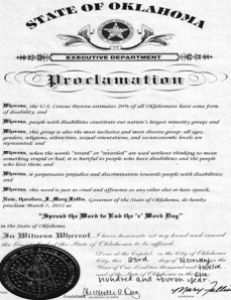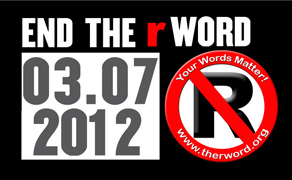“r” Word Promotes Hate and Discrimination in Our Generation
by Sean Lee, A Korean Brookfield Central senior.
Posted on February 23, 2012
http://brookfield-wi.patch.com/blog_posts/r-word-promotes-hate-and-discrimination-in-our-generation
Sticks and stones may break my bones but words will never hurt me. Ridiculous.
There is a reason why rhetoric and the careful use of words has been a skill coveted through the centuries. Words can persuade; they can honor; they can anger; most of all, they can hurt. This is why it concerns me that the word “retard” has become part of the high school vernacular.
I take multiple AP classes. I recognize that I am “smarter” (which is completely different from actually being smarter) than some other students. Give me one reason why I shouldn’t say things like, “Wow, you’re so dumb, you should be in pre-Calculus,” or things like, “Are you serious? Go back to Intro to College Writing.”
I won’t give you one, I’ll give you plenty of reasons why I shouldn’t (and why I don’t) say things like that.
1. It is exclusive. It implies I’m better than you. It implies that I am part of an elite group that is above the rest. When I say that, I am being elitist. When I hear people use the word “retard,” they sound equally elitist. Joseph Stephens, a Special Olympics athlete decries, “What’s wrong with the word ‘retard?’… It means the rest of you are excluding us from your group… We are someone that is not your kind… I want you to know it hurts to be left out here, alone.”
2. It offends not the person I insult, but rather the people my insult references. If you were sitting on the bus and you heard someone say, “You’re only in Algebra II?” How would you feel? What’s to say that a mentally impaired student on a bus wouldn’t feel the same way when someone says, “This is so retarded”? Stephens says, “It hurts and scares me when I am the only person with intellectual disabilities on the bus and young people start making ‘retard’ jokes or references… please put yourself on that bus and fill the bus with people who are different from you. Imagine they start making jokes using a term that describes you.”
Let’s do just that. Imagine you’re sitting in a bus full of kids who have IQs of 200. What if they started making fun of you for being “dumb?” Is it your fault you aren’t as “smart” as them? Did you choose to not be a genius? In the same way, mentally disabled people never chose to be mentally disabled. So why should it be any different?
3. It equates being in so-called “regular” classes with being dumb or stupid, when in truth, such a stereotype is absolutely ridiculous. The same goes for calling people retarded. It implies intellectually impaired people are simply stupid and that no other part of them matters. Proof? Some mentally impaired people are extremely kind. Then why is it that the word “retard” has never once been used to describe those who are extremely kind? Some mentally impaired people are hard working. Then why is it that the word “retard” has never once been used to describe those who are hard working? For this reason, I can safely say that the r-word dehumanizes. It makes them not human. They become one-dimensional caricatures. “Don’t worry about him. He’s just a retard.”
The r-word dehumanizes. It dehumanizes. It dehumanizes. I’m not sure I can say that enough. Mankind has a track record of progression away from dehumanization throughout history. Once, African-Americans were considered dumber than white Americans. Thus, they were enslaved. But eventually we realized the ludicrous nature of slavery and eliminated such atrocities. Not too long ago, whites and minorities were segregated. Racial slurs were commonplace and equality was “unachievable.” But eventually a great man came forward and told us of his dream. Does it mean nothing that “all men are created equal?” Does the Fourteenth Amendment only apply to certain people?
It is finally time for us to make the leap we have made time after time in the past. It is time for us to come together and become better than we were before. It is time for us to grow up.
 Oklahoma Governor Mary Fallin proclaimed March 7, 2012 as “Spread the Word to End the ‘r’ Word Day” in Oklahoma. This day brings awareness that using the words “retard” or “retarded” to mean something stupid or bad is hurtful to people who have disabilities and the people who love them.
Oklahoma Governor Mary Fallin proclaimed March 7, 2012 as “Spread the Word to End the ‘r’ Word Day” in Oklahoma. This day brings awareness that using the words “retard” or “retarded” to mean something stupid or bad is hurtful to people who have disabilities and the people who love them.